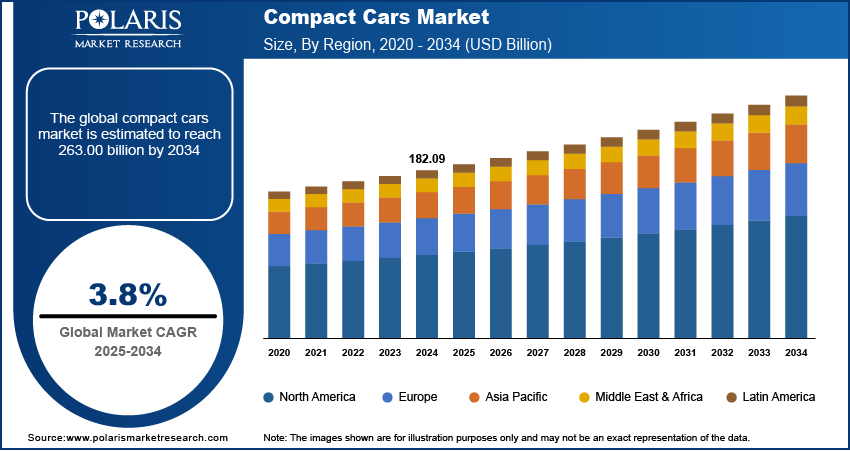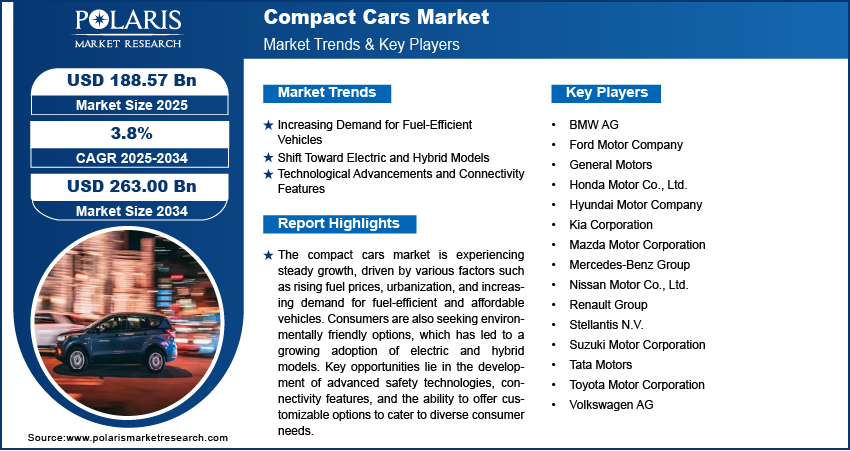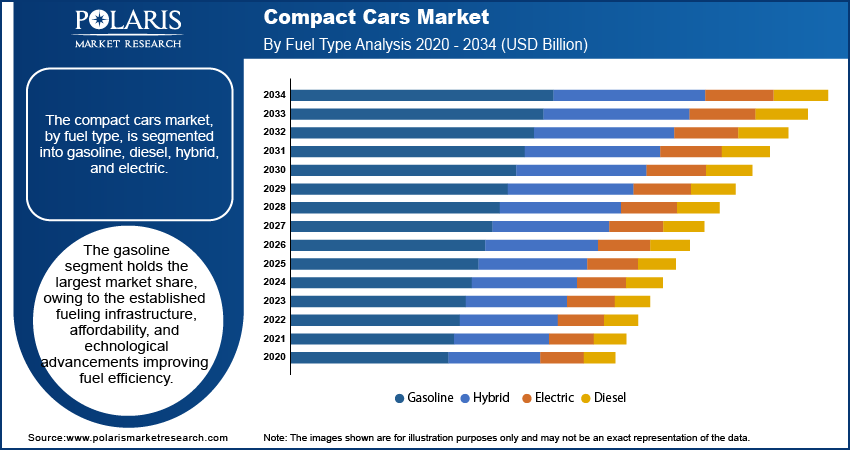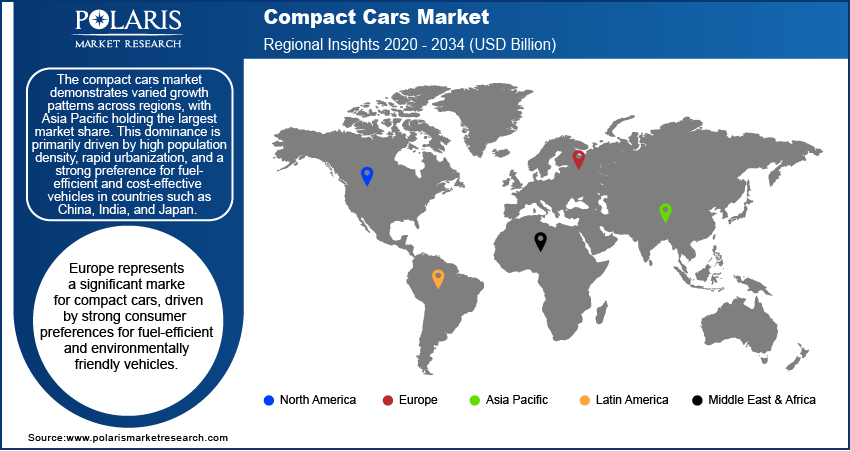
Compact Cars Market Size, Share, Trends, Industry Analysis Report: By Fuel Type (Gasoline, Diesel, Hybrid, and Electric), Body Style (Sedan, Hatchback, SUV, and Crossover), Features (Advanced Safety Systems, Infotainment Systems, and Fuel Efficiency), Application (Private and Commercial), and Region (North America, Europe, Asia Pacific, Latin America, and Middle East & Africa) – Market Forecast, 2025–2034
- Published Date:Feb-2025
- Pages: 119
- Format: PDF
- Report ID: PM3868
- Base Year: 2024
- Historical Data: 2020-2023
Compact Cars Market Overview
The compact cars market size was valued at USD 182.09 billion in 2024. The market is projected to grow from USD 188.57 billion in 2025 to USD 263.00 billion by 2034, exhibiting a CAGR of 3.8% during 2025–2034.
The compact cars market focuses on small-sized vehicles designed to offer efficiency, affordability, and practicality for urban and suburban driving. These vehicles are typically characterized by their reduced dimensions compared to standard sedans and SUVs, making them ideal for navigating crowded cities and offering better fuel efficiency. Key drivers of the compact car market growth include the growing demand for fuel-efficient and environmentally friendly vehicles, increasing urbanization, and rising fuel prices. Additionally, advancements in technology, such as the integration of electric and hybrid models, are fueling trends in the market. The increasing consumer preference for cost-effective transportation options, along with a focus on sustainable mobility, continues to boost the compact cars market demand.

To Understand More About this Research: Request a Free Sample Report
Compact Cars Market Dynamics
Increasing Demand for Fuel-Efficient Vehicles
One of the major compact cars market trends is the rising demand for fuel-efficient vehicles. As global fuel prices continue to fluctuate, consumers are increasingly opting for smaller, more fuel-efficient cars that offer lower operational costs. Compact cars, due to their size and engineering, naturally provide better miles per gallon (MPG) compared to larger vehicles. According to the US Department of Energy, compact cars generally average around 25–30 miles per gallon, which is significantly higher than many midsize or full-size vehicles. This trend is further supported by the growing awareness of environmental issues, pushing both consumers and manufacturers to prioritize fuel economy and low carbon emissions.
Shift Toward Electric and Hybrid Models
Another significant trend in the compact cars market is the transition toward electric and hybrid vehicles. With increasing environmental concerns and government regulations aiming to reduce greenhouse gas emissions, automakers are focusing on producing electric and hybrid compact cars. In 2023, electric vehicle (EV) sales in the US grew by 60%, with compact electric vehicles seeing particularly strong growth. Automakers such as Tesla, Chevrolet, and Nissan are leading in offering compact EVs that combine the benefits of smaller car sizes with zero-emission technology. This shift is largely driven by incentives from governments worldwide, like tax credits and subsidies for electric vehicle purchases, as well as the continued development of EV infrastructure, such as charging stations.
Technological Advancements and Connectivity Features
The integration of advanced technology and connectivity features is another key trend reshaping the compact car market development. Consumers are increasingly demanding cars equipped with advance infotainment systems, advanced driver-assistance systems (ADAS), and seamless smartphone integration. The inclusion of features such as adaptive cruise control, lane-keeping assist, and automatic emergency braking is becoming more common in compact vehicles, enhancing safety and driving experience. The 2023 J.D. Power US Automotive Performance, Execution, and Layout Study found that technology features such as Apple CarPlay and Android Auto are now standard in a significant percentage of compact cars. These advancements improve consumer satisfaction and make smaller vehicles more appealing to tech-savvy consumers, especially younger demographics.

Compact Cars Market Segment Insights
Compact Cars Market Outlook – Fuel Type-Based Insights
The compact cars market, by fuel type, is segmented into gasoline, diesel, hybrid, and electric. The gasoline segment holds the largest market share. Their widespread adoption can be attributed to the established fueling infrastructure, affordability, and technological advancements improving fuel efficiency. Many consumers continue to prefer gasoline models due to their reliability and lower upfront costs compared to alternative fuel options. Automakers are also enhancing gasoline engine technologies, such as turbocharging and direct injection, to meet evolving emissions standards while maintaining vehicle performance.
The electric segment is registering the highest growth within the market, driven by increasing consumer demand for sustainable transportation and government incentives promoting zero-emission vehicles. Factors such as expanding charging networks, declining battery costs, and advancements in electric powertrain technology are encouraging more consumers to adopt electric compact cars. Automakers are focusing heavily on this segment by launching affordable and efficient electric models tailored to urban and suburban driving needs. The rising awareness of environmental issues and stringent emissions regulations are expected to further fuel the demand for electric vehicles, which would boost the segment growth in the coming years.
Compact Cars Market Assessment – Body Style-Based Insights
The compact cars market, by body style, is segmented into sedan, hatchback, SUV, and crossover. The hatchback segment holds the largest market share due to their practicality, affordability, and suitability for urban driving. Hatchbacks are particularly popular in regions with high urbanization, as their compact design allows for easy maneuverability and efficient use of space. The foldable rear seats in hatchbacks provide added versatility, making them ideal for consumers seeking a balance between passenger comfort and cargo capacity. Automakers continue to enhance the design and functionality of hatchbacks, ensuring they remain a preferred choice for budget-conscious and urban-focused consumers.
The SUV segment is registering the highest growth in the market, driven by the increasing demand for vehicles that combine compactness with the versatility of sport utility vehicles. This segment appeals to a wide range of consumers due to its elevated driving position, enhanced safety features, and off-road capabilities, often without the higher costs associated with full-size SUVs. The growing preference for compact SUVs is also fueled by their aesthetic appeal and integration of advanced connectivity and driver-assistance technologies, making them a rapidly growing segment in the compact car market.
Compact Cars Market Evaluation – Features-Based Insights
Based on features, the compact cars market is segmented into advanced safety systems, infotainment systems, and fuel efficiency. The fuel efficiency segment holds the largest market share, as it remains a primary consideration for consumers when selecting compact vehicles. Rising fuel prices and increasing environmental awareness have made fuel-efficient models a preferred choice for cost-conscious buyers. Automakers are continuously improving engine designs and incorporating lightweight materials to enhance the fuel economy of compact cars, ensuring they remain competitive in the market. This focus aligns with regulatory pressures to meet emissions standards, further solidifying the dominance of fuel efficiency as a key feature in this segment.
The advanced safety systems segment is registering the highest growth rate within the compact cars market, driven by growing consumer demand for enhanced safety and government regulations mandating the inclusion of such technologies. Features such as adaptive cruise control, automatic emergency braking, lane-keeping assist, and blind-spot monitoring are increasingly being integrated into compact car models. These systems, once exclusive to premium vehicles, are now widely available in compact cars, making them more appealing to safety-conscious consumers. Automakers are leveraging these advancements to differentiate their offerings, as the inclusion of advanced safety technologies has become a significant factor influencing purchasing decisions.

Compact Cars Market Regional Insights
By region, the study provides compact cars market insights into North America, Europe, Asia Pacific, Latin America, and the Middle East & Africa. The market demonstrates varied growth patterns across regions, with Asia Pacific holding the largest market share. This dominance is primarily driven by high population density, rapid urbanization, and a strong preference for fuel-efficient and cost-effective vehicles in countries such as China, India, and Japan. The presence of leading automakers, extensive production capabilities, and favorable government policies supporting affordable vehicle ownership further fuel the market in this region. Additionally, the increasing adoption of electric and hybrid compact cars, coupled with expanding infrastructure for sustainable mobility, is accelerating the Asia Pacific compact cars market expansion. The region's economic growth and rising disposable incomes also contribute to its leading position in the global market.
Europe represents a significant market for compact cars, driven by strong consumer preferences for fuel-efficient and environmentally friendly vehicles. Stringent emissions regulations and government incentives for electric and hybrid vehicles have accelerated the adoption of advanced technologies in compact cars. Countries such as Germany, France, and the UK are key contributors, supported by robust automotive manufacturing industries and a focus on innovation. The increasing emphasis on urban mobility solutions and sustainable transportation further strengthens the compact cars market in Europe.

Compact Cars Market – Key Market Players and Competitive Insights
Key players in the compact cars market include globally recognized automotive manufacturers that actively compete with diverse offerings in this segment. A few notable companies are Toyota Motor Corporation; Honda Motor Co., Ltd.; Hyundai Motor Company; Kia Corporation; Ford Motor Company; General Motors; Volkswagen AG; BMW AG; Mercedes-Benz Group; Nissan Motor Co., Ltd.; Suzuki Motor Corporation; Tata Motors; Renault Group; Stellantis N.V.; and Mazda Motor Corporation. These companies continue to innovate and expand their portfolios, catering to the increasing demand for compact, fuel-efficient, and technologically advanced vehicles. Stellantis N.V., for example, is a result of the merger between Fiat Chrysler Automobiles and PSA Group, but their brands such as Peugeot and Fiat remain strong players in the compact car market.
The competition in the compact cars market is shaped by various factors such as fuel efficiency, pricing, safety features, and technological advancements. Toyota and Honda maintain strong positions due to their reputation for reliability and extensive global distribution networks. Volkswagen AG and BMW AG have an edge in delivering compact cars with premium features and advanced technologies, appealing to a more upscale customer base. Meanwhile, companies such as Hyundai and Kia are gaining prominence by offering well-designed, affordable vehicles packed with connectivity and safety features, targeting budget-conscious yet tech-savvy consumers. Electric compact models from manufacturers such as Nissan (Leaf) and Tesla (Model 3) further intensify competition, especially in regions with strong demand for sustainable vehicles.
Insights into the competitive landscape reveal a focus on electrification, safety innovations, and catering to diverse consumer preferences. Most automakers are investing heavily in electric and hybrid compact cars to meet stringent emission regulations and the rising popularity of sustainable mobility solutions. Additionally, the inclusion of advanced driver-assistance systems (ADAS) and infotainment technologies has become a common strategy to differentiate offerings. While established brands dominate, new entrants and startups specializing in electric vehicles, such as BYD in China, are beginning to disrupt the market, presenting significant challenges to traditional automakers. This dynamic competition is expected to drive further innovation and price competitiveness across the compact cars market.
Toyota Motor Corporation is a prominent player in the compact cars market, known for its diverse lineup of efficient and reliable vehicles, including the Toyota Corolla and Yaris. The company has been focusing on developing hybrid and electric models to meet the increasing demand for sustainable mobility.
Hyundai Motor Company is a key player in the compact cars market, offering vehicles such as the Hyundai i20 and Elantra. The vehicles cater to consumers seeking affordability and advanced features. The company is actively investing in electric vehicle technology and connectivity enhancements to strengthen its position in the market.
List of Key Companies in Compact Cars Market
- BMW AG
- Ford Motor Company
- General Motors
- Honda Motor Co., Ltd.
- Hyundai Motor Company
- Kia Corporation
- Mazda Motor Corporation
- Mercedes-Benz Group
- Nissan Motor Co., Ltd.
- Renault Group
- Stellantis N.V. (including brands such as Peugeot and Fiat)
- Suzuki Motor Corporation
- Tata Motors
- Toyota Motor Corporation
- Volkswagen AG
Compact Cars Industry Developments
- In November 2023, Hyundai revealed its plans to increase production of its compact electric vehicles, such as the Ioniq 5, in response to growing consumer demand and favorable policies for sustainable transportation. Hyundai's focus on innovation and regional market adaptation supports its competitive edge.
- In October 2023, Toyota announced the launch of its next-generation Prius models, showcasing advancements in hybrid technology, which are expected to influence its compact car offerings significantly. Toyota's strong manufacturing and distribution networks enable it to maintain a solid presence across global markets.
Compact Cars Market Segmentation
By Fuel Type Outlook
- Gasoline
- Diesel
- Hybrid
- Electric
By Body Style Outlook
- Sedan
- Hatchback
- SUV
- Crossover
By Features Outlook
- Advanced Safety Systems
- Infotainment Systems
- Fuel Efficiency
By Application Outlook
- Private
- Commercial
By Regional Outlook
- North America
- US
- Canada
- Europe
- Germany
- France
- UK
- Italy
- Spain
- Netherlands
- Russia
- Rest of Europe
- Asia Pacific
- China
- Japan
- India
- Malaysia
- South Korea
- Indonesia
- Australia
- Vietnam
- Rest of Asia Pacific
- Middle East & Africa
- Saudi Arabia
- UAE
- Israel
- South Africa
- Rest of Middle East & Africa
- Latin America
- Mexico
- Brazil
- Argentina
- Rest of Latin America
Compact Cars Market Report Scope
|
Report Attributes |
Details |
|
Market Size Value in 2024 |
USD 182.09 billion |
|
Market Size Value in 2025 |
USD 188.57 billion |
|
Revenue Forecast by 2034 |
USD 263.00 billion |
|
CAGR |
3.8% from 2025 to 2034 |
|
Base Year |
2024 |
|
Historical Data |
2020–2023 |
|
Forecast Period |
2025–2034 |
|
Quantitative Units |
Revenue in USD billion and CAGR from 2025 to 2034 |
|
Report Coverage |
Revenue Forecast, Market Competitive Landscape, Growth Factors, and Trends |
|
Segments Covered |
|
|
Regional Scope |
|
|
Competitive Landscape |
|
|
Report Format |
|
|
Customization |
Report customization as per your requirements with respect to countries, regions, and segmentation. |
How is the report valuable for an organization?
Workflow/Innovation Strategy
The compact cars market has been broadly segmented on the basis of fuel type, body style, features, and application. Moreover, the study provides the reader with a detailed understanding of the different segments at both global and regional levels.
Growth/Marketing Strategy
The compact cars market growth and marketing strategy focuses on meeting evolving consumer preferences for fuel efficiency, affordability, and advanced features. Automakers are investing in electric and hybrid models to comply with environmental regulations and meet the growing demand for sustainable mobility. They are also enhancing safety and connectivity features to attract tech-savvy consumers. Regional adaptations, such as offering smaller, cost-effective models in emerging markets and premium compact options in developed regions, play a key role. Digital marketing and partnerships with ride-sharing services further support market penetration and consumer engagement.
FAQ's
? The market size was valued at USD 182.09 billion in 2024 and is projected to grow to USD 263.00 billion by 2034.
? The market is projected to register a CAGR of 3.8% during the forecast period.
? Asia Pacific accounted for the largest share of the market in 2024.
? A few notable companies include Toyota Motor Corporation; Honda Motor Co., Ltd.; Hyundai Motor Company; Kia Corporation; Ford Motor Company; General Motors; Volkswagen AG; BMW AG; Mercedes-Benz Group; Nissan Motor Co., Ltd.; Suzuki Motor Corporation; Tata Motors; Renault Group; Stellantis N.V.; and Mazda Motor Corporation.
? The gasoline segment accounted for the largest market share in 2024.
? The hatchbacks segment accounted for the largest market share in 2024.
? A compact car is a classification of vehicles that are smaller than mid-size cars but larger than subcompact cars. The cars offer a balance between size, efficiency, and practicality. Compact cars typically have seating for four to five passengers and are designed with smaller dimensions to enhance maneuverability, particularly in urban and suburban environments. They are known for their fuel efficiency, affordability, and ease of parking, making them a popular choice for individuals and families seeking economical transportation. A few common examples of compact cars are sedans, hatchbacks, and some small SUVs or crossovers.
A few key compact cars market trends are described below: Increased demand for fuel-efficient vehicles: Rising fuel prices and environmental concerns drive consumers to prefer compact cars with better fuel economy. Growth of electric and hybrid models: The shift toward sustainable transportation, supported by government incentives and improving EV infrastructure, boosts the adoption of electric and hybrid compact cars. Technological advancements: The integration of advanced safety features such as ADAS, connectivity systems such as Apple CarPlay and Android Auto, and enhanced infotainment systems is becoming standard. Rising popularity of compact SUVs: Compact SUVs are gaining traction due to their higher driving position, perceived safety, and versatility compared to traditional compact sedans or hatchbacks.
? For a new company entering the compact cars market, focusing on electric and hybrid vehicle offerings could provide a competitive edge, as there is growing demand for sustainable and eco-friendly options. Investing in advanced safety technologies and connectivity features, such as autonomous driving assistance and seamless smartphone integration, would also appeal to tech-savvy consumers. Additionally, offering cost-effective, fuel-efficient models with strong after-sales support and regional customization could attract budget-conscious buyers. Prioritizing efficient manufacturing processes and innovative designs to optimize space in urban environments would further enhance market appeal.
? Companies manufacturing, distributing, or purchasing compact cars and related products, and other consulting firms must buy the report.
